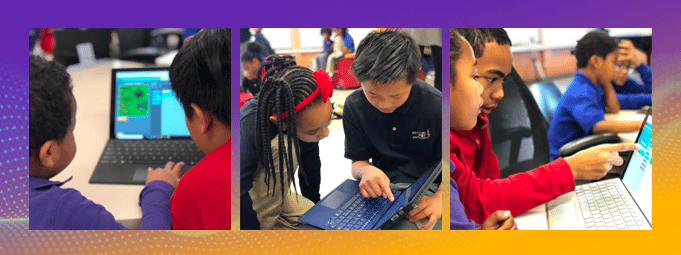
Technology has completely transformed the modern classroom. In the 21st century, AI and other computer science skills will be necessary in a world where technology is everywhere. Coding benefits students by preparing them for a technologically advanced society and can enable computational thinking.
Coding also allows us to communicate with electronic devices such as smartphones, laptops, and tablets. This can open the door to various career opportunities. Aside from opening doors to various jobs, the benefits of coding can be fun to learn and can connect students with a global community, allowing for enhancements in collaboration and team management skills.
Coding is a creative process that can lay a new foundation for innovation and self-expression. It gives students the ability to connect existing ideas with new solutions and concepts. For example, giving your students projects in which they use coding to create an app can further their technical skills and spark their imagination.
All creative thinking starts from questioning your surroundings. A child’s curiosity and imagination can foster their cognitive and social development, problem-solving abilities, and willingness to experiment. In addition, curiosity and creativity can help children to be more confident in their ability to learn new things and boost their motor and sensory development.
The younger a child starts learning how to code, the better. That’s because children have a natural gift for learning foreign languages, and coding includes elements similar to learning a new language. In addition, the benefits of coding can facilitate student collaboration, creativity, and problem-solving skills.
Another great benefit of coding is that it encourages computational thinking. This is a prerequisite skill for understanding technology. Teaching computational thinking encourages students to think in a way that will allow them to understand the digital world.
In turn, this develops critical thinking and problem-solving skills. In fact, the International Society for Technology in Education (ISTE) states that computational thinking improves the ability to design solutions, create new tools, and communicate with automated computer solutions.
Though everyone learns differently, a hands-on approach to learning can greatly enhance a student’s understanding by improving their focus, interest, and retention of the material.
According to one study, students who used a tactile learning approach retained the information better. Hands-on learning can also help build initiative and persistence, resulting in skill growth and development that leads to better team management and collaboration.
Code is a universal language that doesn’t need a translation. Language barriers often stifle productivity, but coding’s universality makes it a highly practical skill to possess, allowing students to thrive in almost any work environment.
In addition, global coding communities allow coding enthusiasts to share knowledge, advice, and skills with each other no matter where they are in the world.
Coding can enable children to create apps and games, design animations and so much more. These skills can translate to other disciplines that will prove helpful across the workforce.
Renton Prep’s technology-focused curriculum helps students develop their curiosity and skills in coding, AI, and more. Our Executive Director, Dr. Michelle Zimmerman believes in preparing students for the future through digital transformation, her book Teaching AI: Exploring New Frontiers for Learning offers a better understanding of how AI impacts a student’s future. If you have any questions, please feel free to contact us today.